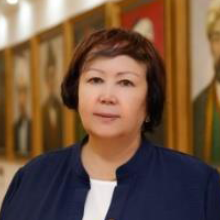
Tulebike Kulgildinova
Work place: International Communications Department, Kazakh University of International Relations and World Languages Almaty, 050025, Kazakhstan
E-mail: tulebike@mail.ru
Website: https://orcid.org/0000-0002-7758-0758
Research Interests:
Biography
Tulebike Kulgildinova, Doctor of Pedagogical Sciences, Professor at Kazakh Ablai Khan University of International Relations and World Languages. In 2010, she received the degree of Doctor of Pedagogical Sciences in the specialty code 13.00.02 - theory and methods of teaching and education. Her research interests: Scientific and methodological foundations for the formation of cognitive and communicative competence in Russian language lessons in primary school (in schools with Russian as the language of instruction). She is the author of Russian language textbooks for schools in the Republic of Kazakhstan. She is engaged in scientific research in the field of theory and practice of training future teachers for all levels of education, innovative processes in education, national and foreign language education. Project Leader: ―Building a model of non–formal education "student – university – external educational environment."
Author Articles
The Influence of an Adaptive Non-Formal Education Model on Student Learning Activity and Engagement
By Tulebike Kulgildinova Araily Sarsembayeva Darya Surova Indira Kalelova Meruyert Zhaizhatyrova Saniya Nurgaliyeva
DOI: https://doi.org/10.5815/ijmecs.2025.05.06, Pub. Date: 8 Oct. 2025
In the context of ongoing digitalization and the growing importance of non-formal education in Kazakhstan’s higher education system, there is an increasing demand for adaptive educational models that address students' individual learning needs and broaden the scope of academic engagement. This study examines the effects of an adaptive non-formal education model on students' learning activity and engagement, and identifies the model components with the most significant impact. A quantitative quasi-experimental design was employed, involving pre- and post-intervention assessments using validated questionnaires. Key indicators included participation in supplementary educational activities, online learning platforms, external courses, and project-based or volunteer initiatives. The results indicate a statistically significant improvement in students’ educational involvement in the experimental group, as demonstrated by increased participation in external learning events, greater self-directed learning, and the development of personalized educational trajectories. The study highlights the potential of adaptive non-formal education as a strategic tool to enhance institutional flexibility and student motivation. Its novelty lies in testing a context-sensitive adaptive non-formal education model tailored to Kazakhstan’s institutional realities. The findings contribute to the global discourse on flexible education strategies and suggest directions for scaling and integrating the model into digital academic ecosystems.
[...] Read more.Other Articles
Subscribe to receive issue release notifications and newsletters from MECS Press journals